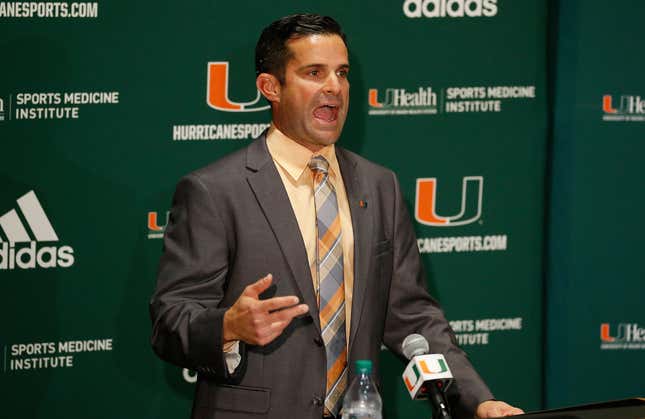
Manny Diaz, who was very briefly the Temple Owls’ head coach before he abandoned his contract without coaching a single game because he found a more appealing job with the Miami Hurricanes, would be better served staying away from demanding pledges of fealty from college football recruits, especially when they’re not prevented from taking visits elsewhere.
Marcus Clarke, a recruit who had met with Diaz in July and committed to Miami, told Manny Navarro of The Athletic that the coach tried to persuade him to stop visiting any other schools and pledge their souls to the Canes. From the report:
“He told me once I’m fully committed, he didn’t want me to take any more (official) visits because Miami is the place to be and no other place is really worth visiting if you really want to be committed to the new Miami,” Clarke said Tuesday night.
“I was kind of shocked. … Usually coaches are like, ‘Go ahead and take your visits because you don’t get a lot of them.’ I do kind of feel like I still want to take my visits. I’m still thinking about it right now. But I do just want to stay humble to Miami. So, I want to see (the next) game, see how it goes.”
Another recruit, Xavier Restrepo, confirmed having a similar experience with Diaz, saying the coach told players and parents “you’re either going to be with Miami kicking tails or you’re going to go against Miami and get your tail kicked.”
When Diaz was on a radio show that same month talking about “what it means to be a Miami Hurricane,” he tried to make it sound like playing college football for him was a bond on par with marriage—you know, except one side of the relationship has all the power:
“If we all love this great football program, we should not let others defile it, in my opinion,” Diaz said. “And for whatever reason, that’s happened too often in recruiting in the last few years and that’s one of the things we’re really trying to change and stamp out and make these young men in South Florida understand. It means something to be a Miami Hurricane. And if you don’t understand what it means, that’s fine, you can go somewhere else. But we will win games here with people who understand the culture of being a Hurricane, the culture of competing for your community, and wearing that U with pride.”
When asked by Navarro about those comments this week, Diaz just kept beating the “commitment” drum:
“What I’ll tell you broadly is there are some things that we are changing in terms of what we will do to take a commitment,” he said. “Not all those things are necessary grandfathered. But there are some things going forward that defines what it means to be committed to Miami, a series of criteria that has to happen for that to happen. There was a series of criteria of what happens once you are committed to Miami that’s never been in place in the past, and (that’s something) our recruits are aware of now.”
That criteria seems to include: Only come to Miami if you promise not to follow in coach’s footsteps. This past December, Diaz signed a five-year deal with Temple and then left within a month. Commitment here is a one-way street. If Diaz gets fired—the Hurricanes are 0-2 this season for the first time since 1978, although it’s his first season—or more likely, if Diaz abandons ship for job security elsewhere down the line, is he going to take all those 100-percent committed players with him?